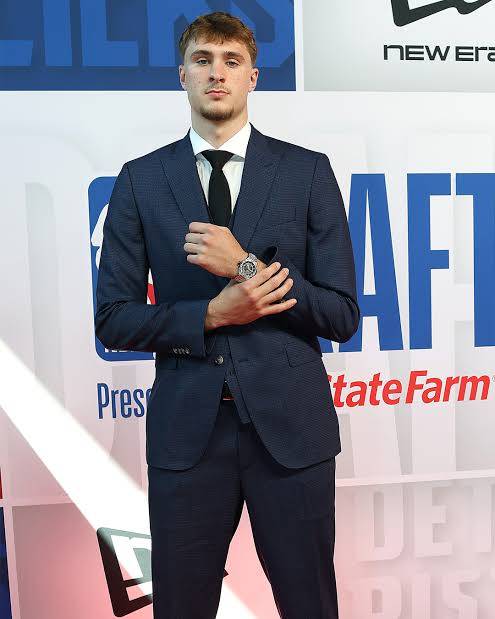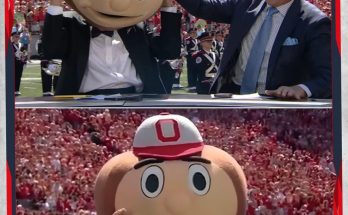Years before signing a rookie contract with the Dallas Mavericks, netting him $13.8 million, Cooper Flagg was just a hardworking kid growing up in the rural quiet of Newport, Maine. The polished hardwood floors of NBA arenas may seem worlds away from the muddy fields and cold early mornings of a Maine farm, but for those who know him best, it’s no surprise that his intense drive, fierce work ethic, and relentless pursuit of excellence were forged long before the bright lights of the draft stage.
Flagg’s journey to becoming one of the NBA’s most talked-about young stars is often recounted in terms of high school highlights, viral dunk reels, and dominant performances on national circuits. But his story runs deeper than that. The roots of his competitive edge, both literally and figuratively, trace back to the rich soil of his family’s land and the daily grind that came with growing up in a town of fewer than 4,000 people. While others might have seen chores and labor as a burden, Flagg turned them into lessons in discipline, persistence, and mental toughness.
There’s a specific brand of resilience that’s born on farms. It’s the kind where 5:00 a.m. wake-up calls are routine, not exceptional. Where shoveling snow, stacking firewood, hauling hay, or tending to animals isn’t a task you put off—it’s part of the rhythm of life. For Cooper Flagg, these were not distractions from his basketball dreams; they were the foundation upon which those dreams were built. He didn’t just learn how to use his body to lift or move or build—he learned how to push through discomfort, how to embrace responsibility, how to keep moving forward when quitting would have been easier.
His father, Ralph Flagg, was a constant presence and a crucial influence. A former college athlete himself, Ralph believed in instilling values before victories. He didn’t pressure Cooper to be a star, but he never allowed excuses either. Ralph often said, “Hard work isn’t optional. It’s what we do.” And Cooper listened. Whether it was doing extra conditioning runs in the snow, shooting baskets outside with gloves on in biting cold, or fixing a fence before heading to a game, Cooper never viewed those things as obstacles. They were just part of the journey.
That mental framework—one built not in gyms, but in the solitude of rural life—is what separated him as a young player. When others might have buckled under the weight of pressure, Flagg seemed to thrive in it. Coaches often noted how he never flinched in tight games. Even as a teenager, he carried himself with a kind of emotional maturity and groundedness that belied his years. He didn’t need affirmation; he’d already proven to himself, through years of sweat and solitude, that he could handle whatever came his way.
At Nokomis Regional High School, it didn’t take long for Flagg to show he was different. His physical gifts were undeniable—a 6’8″ frame with guard-like agility and a motor that never stopped—but it was his mentality that really caught attention. Every loose ball, every rebound, every defensive possession was treated like it meant something. Teammates were often inspired, and sometimes intimidated, by the intensity with which he approached the game. It wasn’t just about winning; it was about doing things the right way, every single time.
What many outsiders didn’t see was that his time on the farm didn’t stop when his basketball star began to rise. Even as he gained national recognition—after leading Nokomis to a state title and later transferring to Montverde Academy in Florida—he always came back home during the offseason. Friends remember seeing him help his family with yardwork or clearing brush, the same way he did before he was a projected lottery pick. The money, the fame, the fanfare—none of it changed how he saw his roots. They weren’t something to outgrow, but something to hold on to.
As Flagg declared for the NBA Draft and became one of the most closely watched rookies in recent memory, scouts and executives couldn’t stop praising his intangibles. Yes, he was a generational talent. Yes, he could shoot, defend, and pass with the best of them. But what made him truly special was how he carried himself. There was no entitlement, no ego, no sense of being owed anything. Every workout was approached like he still had something to prove, and in many ways, he did—to himself, not anyone else.
That mentality paid off. On draft night, when his name was called by the Dallas Mavericks, Flagg didn’t leap out of his chair or break down in tears. Instead, he stood calmly, smiled, hugged his family, and said quietly, “Let’s go to work.” For those who knew his backstory, it was the most Cooper Flagg reaction possible. Because for him, being drafted wasn’t the destination. It was just the next stop in a journey that began in a small town, on a small farm, with big dreams and bigger expectations.
His rookie contract—valued at $13.8 million—is a life-changing sum for anyone. But if you ask Flagg what it means to him, he’s more likely to talk about what he wants to do with it than what he wants to buy. He’s already expressed interest in investing in his hometown and creating programs for youth athletes in Maine. His loyalty to the people and places that shaped him isn’t performative; it’s deeply personal.
Flagg’s early practices with the Mavericks have already shown glimpses of what he’ll bring to the team. Coaches describe him as “obsessed with improvement” and “unusually locked in.” Veterans on the team have praised his willingness to ask questions, his humility, and his unrelenting effort in drills. He dives for loose balls in scrimmages, hustles back on every possession, and treats summer league games like they’re Game 7 of the Finals. It’s a mindset not all rookies carry, and it’s exactly what makes him so valuable.
That hunger, that willingness to outwork everyone in the room, isn’t something you can teach. It has to be lived, felt, and earned. And for Cooper Flagg, it was earned through years of grit on a Maine farm, through snowstorms and summer heat, through daily reminders that success isn’t handed to you—it’s built, one early morning at a time.
In an era of social media fame, highlight reels, and instant gratification, Flagg is a refreshing throwback. He doesn’t seek out cameras. He’s not interested in brand deals for the sake of vanity. He wants to win, to compete, and to represent something larger than himself. His background keeps him grounded, and his ambition keeps him climbing.
So when you watch Cooper Flagg take the court this season in a Mavericks jersey, making electrifying plays and competing like every possession matters, remember: that fire didn’t start in a gym. It started years ago, in the chilled dawn hours of a Maine morning, where a boy learned to work before he ever learned to dribble. That’s where greatness took root—not in flash, but in fundamentals, in family, and in a fierce, unwavering belief that anything worth having is worth working for.
In many ways, Flagg’s story isn’t just about basketball. It’s about identity, about character, about how the quiet moments—the ones without crowds or cameras—shape the loudest triumphs. And as his NBA career unfolds, don’t be surprised when he becomes more than just a great player. He may well become a symbol of how enduring values, born in unlikely places, can define a superstar.



